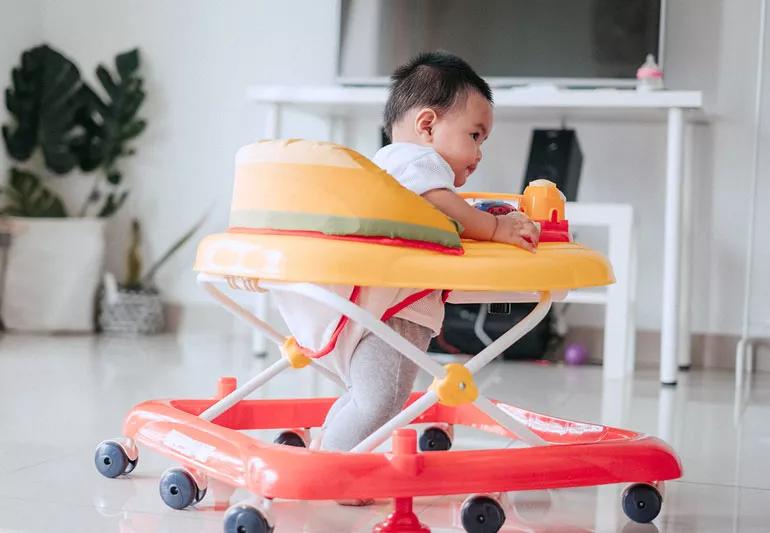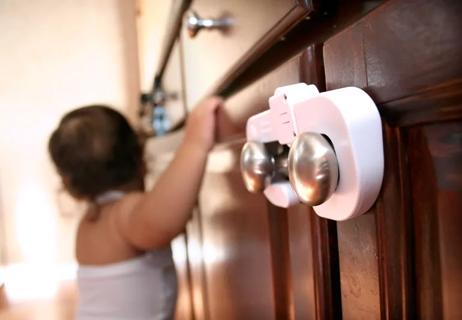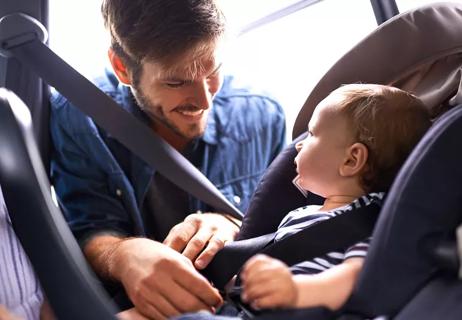Thousands of head and neck injuries occur every year

For first-time parents, the sheer amount of gadgets available to growing babies can be overwhelming. But there’s one device that experts say parents should avoid: the infant walker.
Advertisement
Cleveland Clinic is a non-profit academic medical center. Advertising on our site helps support our mission. We do not endorse non-Cleveland Clinic products or services. Policy
A recent study shows that even after new safety standards were issued in 2010, infant walkers are still associated with thousands of injuries to children each year.
The study shows that while injuries have decreased in the last 10 years, infant walkers are still responsible for many injuries to the head and neck — including skull fractures.
Infant walkers, designed for use by children between the ages of five to 15 months, are circular, wheeled devices with a suspended seat in the center for your baby to sit in. The suspended seat allows your baby’s feet to touch the ground and “walk” around.
And while these devices used to be must-haves for parents helping their babies learn how to walk, they have become serious safety hazards and should be avoided at all costs.
“It may seem obvious that a child could get away from you quickly and tumble down the stairs. But some of the other injuries that people don’t frequently think about are from being able to reach up higher and pull things down on top of themselves — reaching for a stove or grabbing for a candle,” says pediatrician Kimberly Giuliano, MD. “They can get into things that would otherwise be out of their reach.”
“Children can be very fast in a walker — capable of moving several feet in a manner of seconds — even faster than a running adult,” Dr. Giuliano says.
Advertisement
And don’t even think about placing your baby in an infant walker outdoors. The ground may be flat and they may be near soft grass, but the danger of wheeling into a pool or out onto the street is very real.
In addition to being a safety hazard, Dr. Giuliano says there’s also a general misconception about the value that infant walkers provide to children.
“They can delay a child’s motor development,” she says. “The walking motion that you do in a walker is using muscles very differently than when you’re actually walking on your own. Therefore, a child who walks in a walker may walk later than a child who’s given the time to explore those muscle groups independently and figure it out themselves.”
Another study conducted in 2019 further proves Dr. Giuliano’s point, sharing reports of lower locomotive development test scores for babies who used baby walkers than those who did not.
For parents who are just hoping to have five minutes to fold some laundry or get dinner on the stove, Dr. Giuliano says there are stationary play devices that are a much safer alternative. A simple solution is to safely place your baby in a high chair.
Other options include the use of a playpen or blocking off a portion of the room with baby gates. However, even when using these recommended methods, Dr. Giuliano advises parents to make sure their child is in sight at all times.
And when it comes to using any infant device, it’s best to make sure the device is right for the size of the child. “As a child gets to be bigger and taller, there is the concern that they could potentially topple over a play device,” Dr. Giuliano says. “A child who lunges a lot, if their waist is very close to the top of the device, there’s a possibility that they could topple it over.”
If you have additional questions about devices that pose a safety risk to children, ask your pediatrician or follow our guide to childproofing your home.
Advertisement

Sign up for our Health Essentials emails for expert guidance on nutrition, fitness, sleep, skin care and more.
Learn more about our editorial process.
Advertisement

Use these precautions to guard against tragedy

Bath toys with little holes in the bottom are more likely to retain moisture and start to mold

Babies born preterm may need special precautions to ride safely in a car

Keep your child rear-facing as long and possible, and ensure proper fit and installation

Install cabinet locks, outlet covers and safety gates to keep your child safe

Get the answer along with tips for safe installation

How to know when your child’s ready to face front, switch to a booster seat and more

How to keep your little one warm and safe in the car

Even small moments of time outdoors can help reduce stress, boost mood and restore a sense of calm

A correct prescription helps your eyes see clearly — but as natural changes occur, you may need stronger or different eyeglasses

Both are medical emergencies, but they are very distinct events with different causes